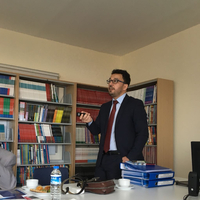
Emrah Cinkara
Language learning and teaching
less
Related Authors
Ozlem Khan
Hacettepe University
Tunay Taş
Bozok University
Darío Luis Banegas
University of Edinburgh
Masoumeh Rahimpanah
Azad University Central Tehran Branch
Muhammad Amjad
Riphah International University
Dr. Adnan Tahir
University Of Education,Okara
Scott J. Shelton Strong
Kanda University of International Studies
InterestsView All (13)










Uploads
Papers by Emrah Cinkara
The study also showed that students are encouraged and improved, when English teachers provide them with optimistic and constructive written feedback. It was also observed that students show high preference of specific written feedback to facilitate the correction of mistakes. The findings showed that teachers' positive written feedback on their daily assignments and paper tests was highly preferred by students. Additionally, the study showed that teachers' written feedback in its time has a powerful impact on students' writing skills. A t-test analysis indicated that there were no statistically significant differences between male and female teachers and also students towards teacher written feedback.
Online teaching has long been a key area of interest recently in every field of education as well as English language teaching. Numerous hardware tools, such as, mp3 players, mobile devices, and so on; and software applications, such as, podcasts, wikis, learning management systems, and so on, have been used in distance and online instruction and they have proved to be useful in facilitating learning individually (Finger, Sun, & Jamieson-Proctor, 2010). Learning management systems (LMS) provide a virtual environment and various tools to support learning. The current institution where the researchers work deliver two 2-credit online English courses for a specific group of learners at a state university in south-eastern Turkey by using Modular Object Oriented Distance Learning Environment (MOODLE). Moodle is an open code LMS which provides teachers and course developers with numerous online tools to enhance distance learning/teaching environment. The course has both a synchronous and asynchronous instruction. Synchronous and asynchronous instructions are associated with the delivery of content in campus-based environments; however, their role differs in off the campus environments as they solve the problems of distance learners. Universities, colleges, and other education institutions are integrating online learning into every aspect of higher education. Many teachers and faculty members at higher education institutions who already run face-toface courses have a website to post lecture notes or slide presentations as well as other course material. There is no doubt that these are effective strategies to expand teaching efforts. Still, there are other educators who design and teach totally online classes. The main purpose of this paper is to evaluate learners’ attitudes towards these online language courses, and there are two objectives of this research. The first one is to discover learners’ attitudes towards the online English course; and the second purpose is to evaluate and correlate learners’ attitudes with their success determined with their end-of-the-year grades. For the unique purpose of this study, an Online Language Learning Attitude Test (OLLAT) has been constructed and distributed to about 7000 learners who were invited to complete this task online. 3516 of these learners took the OLLAT voluntarily and 1783 were successfully completed the test and were included in this study. The findings showed that there is a statistically significant positive correlation between learners’ OLLAT scores and their course success.
Keywords: Attitudes, online language learning, success
The study also showed that students are encouraged and improved, when English teachers provide them with optimistic and constructive written feedback. It was also observed that students show high preference of specific written feedback to facilitate the correction of mistakes. The findings showed that teachers' positive written feedback on their daily assignments and paper tests was highly preferred by students. Additionally, the study showed that teachers' written feedback in its time has a powerful impact on students' writing skills. A t-test analysis indicated that there were no statistically significant differences between male and female teachers and also students towards teacher written feedback.
Online teaching has long been a key area of interest recently in every field of education as well as English language teaching. Numerous hardware tools, such as, mp3 players, mobile devices, and so on; and software applications, such as, podcasts, wikis, learning management systems, and so on, have been used in distance and online instruction and they have proved to be useful in facilitating learning individually (Finger, Sun, & Jamieson-Proctor, 2010). Learning management systems (LMS) provide a virtual environment and various tools to support learning. The current institution where the researchers work deliver two 2-credit online English courses for a specific group of learners at a state university in south-eastern Turkey by using Modular Object Oriented Distance Learning Environment (MOODLE). Moodle is an open code LMS which provides teachers and course developers with numerous online tools to enhance distance learning/teaching environment. The course has both a synchronous and asynchronous instruction. Synchronous and asynchronous instructions are associated with the delivery of content in campus-based environments; however, their role differs in off the campus environments as they solve the problems of distance learners. Universities, colleges, and other education institutions are integrating online learning into every aspect of higher education. Many teachers and faculty members at higher education institutions who already run face-toface courses have a website to post lecture notes or slide presentations as well as other course material. There is no doubt that these are effective strategies to expand teaching efforts. Still, there are other educators who design and teach totally online classes. The main purpose of this paper is to evaluate learners’ attitudes towards these online language courses, and there are two objectives of this research. The first one is to discover learners’ attitudes towards the online English course; and the second purpose is to evaluate and correlate learners’ attitudes with their success determined with their end-of-the-year grades. For the unique purpose of this study, an Online Language Learning Attitude Test (OLLAT) has been constructed and distributed to about 7000 learners who were invited to complete this task online. 3516 of these learners took the OLLAT voluntarily and 1783 were successfully completed the test and were included in this study. The findings showed that there is a statistically significant positive correlation between learners’ OLLAT scores and their course success.
Keywords: Attitudes, online language learning, success